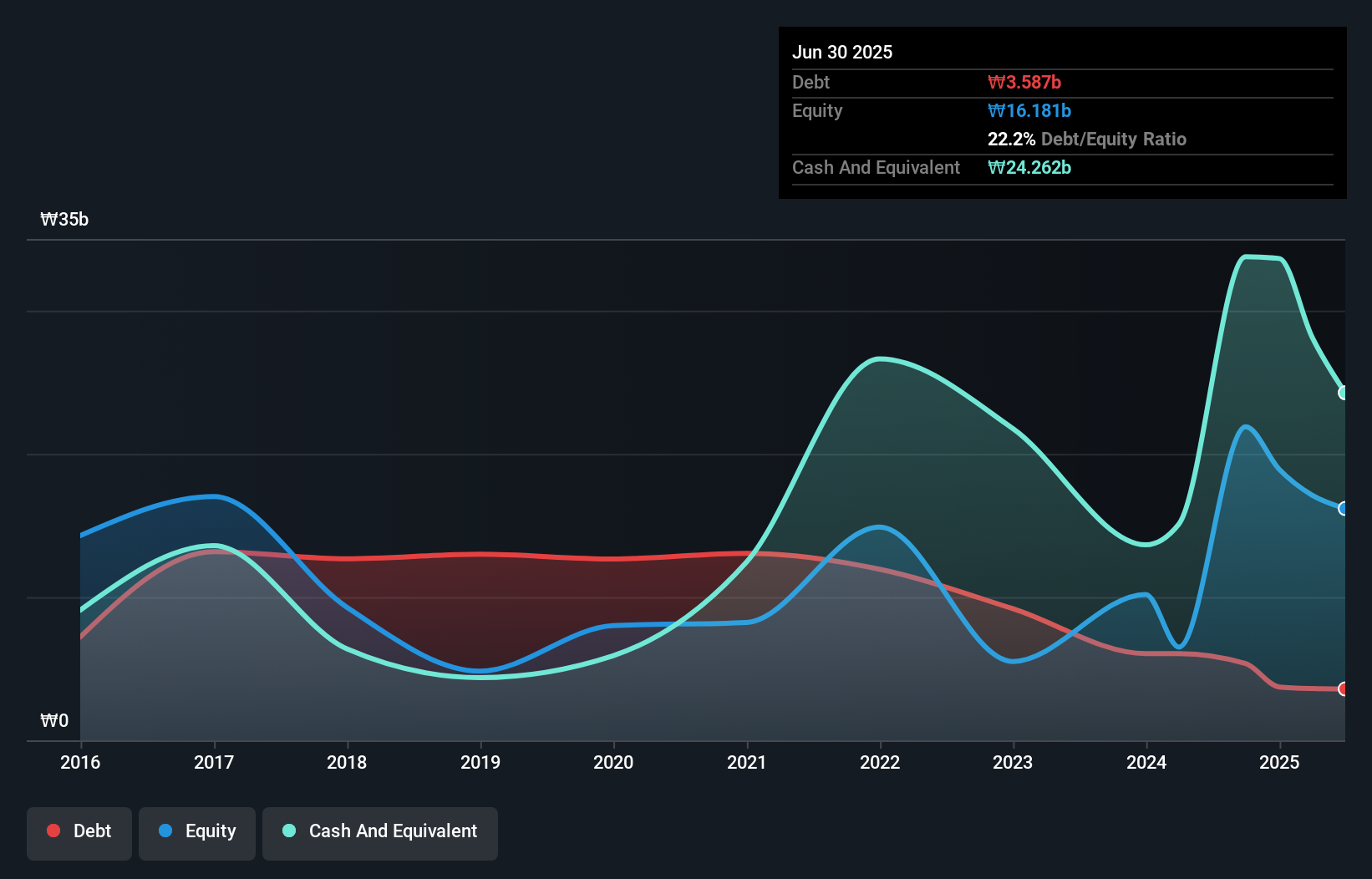Warren Buffett famously said, 'Volatility is far from synonymous with risk.' It's only natural to consider a company's balance sheet when you examine how risky it is, since debt is often involved when a business collapses. We note that Bankware Global Co., Ltd. (KOSDAQ:199480) does have debt on its balance sheet. But is this debt a concern to shareholders?
Why Does Debt Bring Risk?
Debt assists a business until the business has trouble paying it off, either with new capital or with free cash flow. Ultimately, if the company can't fulfill its legal obligations to repay debt, shareholders could walk away with nothing. However, a more usual (but still expensive) situation is where a company must dilute shareholders at a cheap share price simply to get debt under control. By replacing dilution, though, debt can be an extremely good tool for businesses that need capital to invest in growth at high rates of return. When we think about a company's use of debt, we first look at cash and debt together.
What Is Bankware Global's Debt?
The image below, which you can click on for greater detail, shows that Bankware Global had debt of ₩3.59b at the end of June 2025, a reduction from ₩6.05b over a year. But it also has ₩24.3b in cash to offset that, meaning it has ₩20.7b net cash.

A Look At Bankware Global's Liabilities
The latest balance sheet data shows that Bankware Global had liabilities of ₩15.3b due within a year, and liabilities of ₩16.8b falling due after that. Offsetting this, it had ₩24.3b in cash and ₩5.63b in receivables that were due within 12 months. So its liabilities outweigh the sum of its cash and (near-term) receivables by ₩2.27b.
Given Bankware Global has a market capitalization of ₩66.1b, it's hard to believe these liabilities pose much threat. But there are sufficient liabilities that we would certainly recommend shareholders continue to monitor the balance sheet, going forward. Despite its noteworthy liabilities, Bankware Global boasts net cash, so it's fair to say it does not have a heavy debt load! The balance sheet is clearly the area to focus on when you are analysing debt. But it is Bankware Global's earnings that will influence how the balance sheet holds up in the future. So if you're keen to discover more about its earnings, it might be worth checking out this graph of its long term earnings trend.
Check out our latest analysis for Bankware Global
In the last year Bankware Global had a loss before interest and tax, and actually shrunk its revenue by 3.1%, to ₩55b. That's not what we would hope to see.
So How Risky Is Bankware Global?
Statistically speaking companies that lose money are riskier than those that make money. And the fact is that over the last twelve months Bankware Global lost money at the earnings before interest and tax (EBIT) line. And over the same period it saw negative free cash outflow of ₩4.3b and booked a ₩9.4b accounting loss. But the saving grace is the ₩20.7b on the balance sheet. That kitty means the company can keep spending for growth for at least two years, at current rates. Overall, we'd say the stock is a bit risky, and we're usually very cautious until we see positive free cash flow. There's no doubt that we learn most about debt from the balance sheet. But ultimately, every company can contain risks that exist outside of the balance sheet. Case in point: We've spotted 3 warning signs for Bankware Global you should be aware of, and 2 of them are concerning.
If you're interested in investing in businesses that can grow profits without the burden of debt, then check out this free list of growing businesses that have net cash on the balance sheet.
Valuation is complex, but we're here to simplify it.
Discover if Bankware Global might be undervalued or overvalued with our detailed analysis, featuring fair value estimates, potential risks, dividends, insider trades, and its financial condition.
Access Free AnalysisHave feedback on this article? Concerned about the content? Get in touch with us directly. Alternatively, email editorial-team (at) simplywallst.com.
This article by Simply Wall St is general in nature. We provide commentary based on historical data and analyst forecasts only using an unbiased methodology and our articles are not intended to be financial advice. It does not constitute a recommendation to buy or sell any stock, and does not take account of your objectives, or your financial situation. We aim to bring you long-term focused analysis driven by fundamental data. Note that our analysis may not factor in the latest price-sensitive company announcements or qualitative material. Simply Wall St has no position in any stocks mentioned.
About KOSDAQ:A199480
Bankware Global
Engages in the development, supply, and sale of financial software in South Korea and internationally.
Flawless balance sheet with low risk.
Market Insights
Community Narratives




